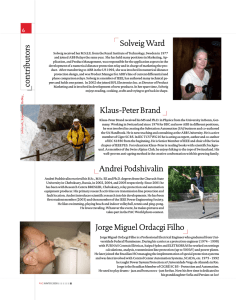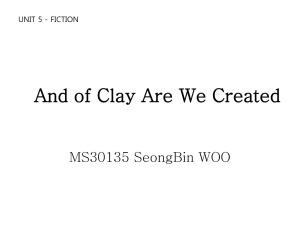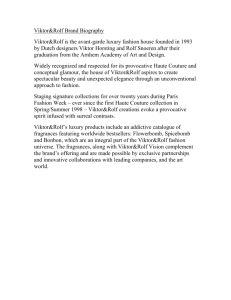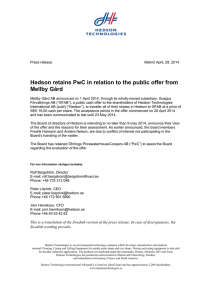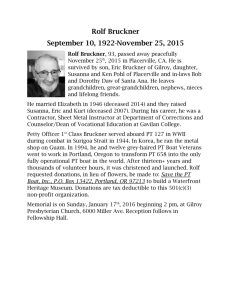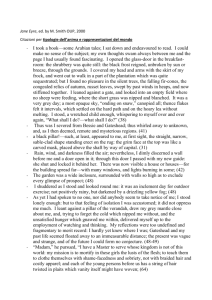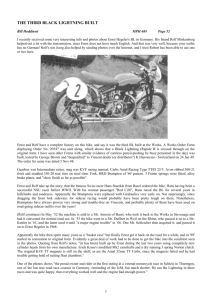Rebecca Lee The Banks of the Vistula
advertisement
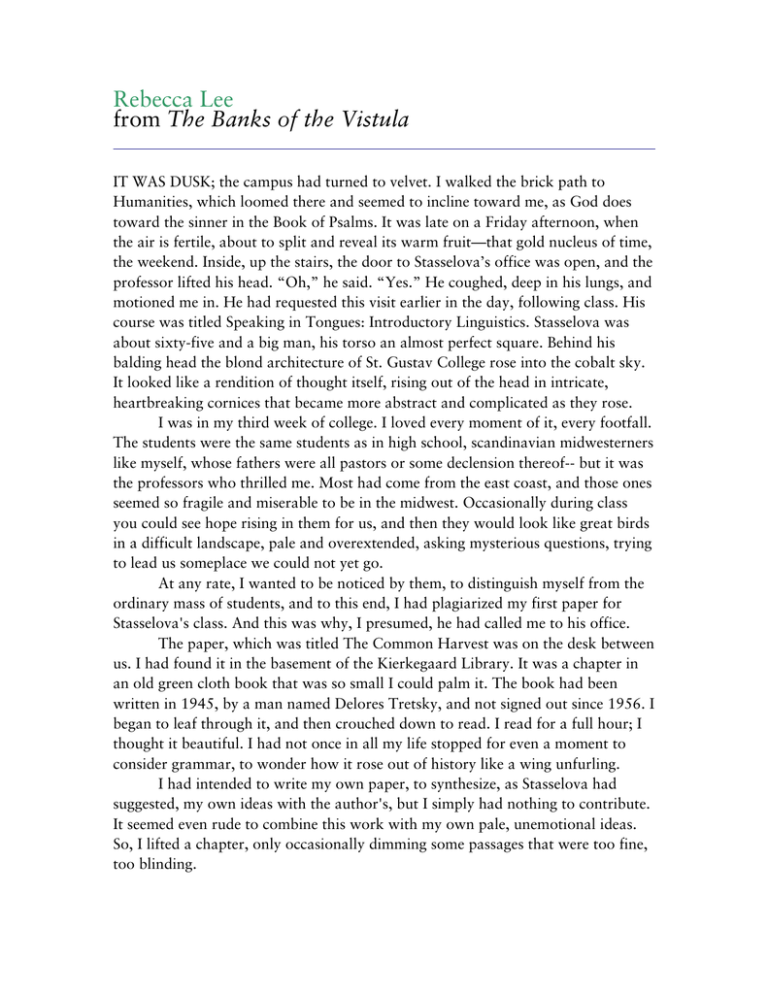
Rebecca Lee from The Banks of the Vistula IT WAS DUSK; the campus had turned to velvet. I walked the brick path to Humanities, which loomed there and seemed to incline toward me, as God does toward the sinner in the Book of Psalms. It was late on a Friday afternoon, when the air is fertile, about to split and reveal its warm fruit—that gold nucleus of time, the weekend. Inside, up the stairs, the door to Stasselova’s office was open, and the professor lifted his head. “Oh,” he said. “Yes.” He coughed, deep in his lungs, and motioned me in. He had requested this visit earlier in the day, following class. His course was titled Speaking in Tongues: Introductory Linguistics. Stasselova was about sixty-five and a big man, his torso an almost perfect square. Behind his balding head the blond architecture of St. Gustav College rose into the cobalt sky. It looked like a rendition of thought itself, rising out of the head in intricate, heartbreaking cornices that became more abstract and complicated as they rose. I was in my third week of college. I loved every moment of it, every footfall. The students were the same students as in high school, scandinavian midwesterners like myself, whose fathers were all pastors or some declension thereof-- but it was the professors who thrilled me. Most had come from the east coast, and those ones seemed so fragile and miserable to be in the midwest. Occasionally during class you could see hope rising in them for us, and then they would look like great birds in a difficult landscape, pale and overextended, asking mysterious questions, trying to lead us someplace we could not yet go. At any rate, I wanted to be noticed by them, to distinguish myself from the ordinary mass of students, and to this end, I had plagiarized my first paper for Stasselova's class. And this was why, I presumed, he had called me to his office. The paper, which was titled The Common Harvest was on the desk between us. I had found it in the basement of the Kierkegaard Library. It was a chapter in an old green cloth book that was so small I could palm it. The book had been written in 1945, by a man named Delores Tretsky, and not signed out since 1956. I began to leaf through it, and then crouched down to read. I read for a full hour; I thought it beautiful. I had not once in all my life stopped for even a moment to consider grammar, to wonder how it rose out of history like a wing unfurling. I had intended to write my own paper, to synthesize, as Stasselova had suggested, my own ideas with the author's, but I simply had nothing to contribute. It seemed even rude to combine this work with my own pale, unemotional ideas. So, I lifted a chapter, only occasionally dimming some passages that were too fine, too blinding. "This is an extraordinary paper," he said. He was holding his coffee cup over it, and I saw some had already spilled on the page in the form of a small, murky pond. "Thank you," I said "It seemed quite sophisticated. You must not be straight out of high school." "I am," I said. "Oh. Well, good for you." "Thanks." "You seem fully immersed in a study of oppression. Any reason for this?" "Well, I do live in the world." "Yes, that's right. And you say here, a shocking line, that a language must sometimes be repressed, and replaced for the larger good. You believe this?" "Yes." "You think that the East Bloc countries should be forced to speak, as you say here, the Mother Tongue?" Some parts of the paper I had just copied down verbatim, without really understanding, and now I was stuck with them. Now they were my opinions. "Yes," I said. "You know I am from this region." "Is that right?" "From Poland." "Whereabouts in Poland?" I asked, conversationally. "The edge of it, the black forest, before Russia took it over completely. As a child, we were forced to speak Russian, even in our homes, even when we said goodnight to our mothers as we fell off to sleep." "Oh my." "When did you write this?" he asked. "Last week." "It reads like it was written fifty years ago. It reads like Soviet Propoganda." "Oh," I said. "I didn't mean it that way." "Did somebody help you?" "Actually, yes. Certainly that's all right?" "Of course, if done properly. Who was it that helped you, a book or a person?" "My roomate helped me," I said. "Your roomate. What is her name?" "Solveig." "Solveig what?" "Solveig Juliusson." "Is she a linguistics scholar?" "No, just very bright." "Maybe I can talk to Solveig myself?" "Unfortunately, you can't." "Why not?" "It's complicated." "In what way?" "Well, she's stopped eating. She's very thin; her parents were worried so they took her home." "Where does she live?" "I don't know." We both sat silently. Luckily, I had experience lying to my pastor father, and knew it was possible to win even though both parties were aware of the lie. The whole exercise was not a search for truth at all, but rather a test of exterior reserve. "I'm sure she'll be returning soon," I said. "I'll have her call you." Stasselova smiled. "Tell her to eat up," he said, his sarcasm curled inside his concern. "Okay," I said, and got up, hoisted my bag over my shoulder. As I stood I could see the upper edge of the sun, as it fell down off the hill on which St. Olaf was built. I'd never really seen the sun from this angle before, from above as it fell, as it so obviously lit up another part of the world, perhaps even flaming up the sights of Stasselova's precious, oppressed Poland, its black forests and oniondome churches, its dreamy and violent borders. My roomate Solveig was permanently tan. She went twice a week to the booth and bleached her hair frequently, so that it looked like radioactive foliage growing out of dark moody sands. Despite all of this, she was very sensible. "Margaret," she said, when I came in that evening. "The library telephoned to recall a book. They said it was urgent." I had thought he might check the library. "Okay," I said. As I rifled through the clothes on my closet floor, I decided it would have to be burned. I would finish the book and then I would burn it. But first there was tonight, and I had, that rare thing, a date. My date was from Stasselova's class. His name was Rolf; he was a junior whose father was a diplomat. He had almost auburn hair that fell to his neckline. He wore, always, long white shirts whose sleeves were just slightly, almost imperceptively puffed at the shoulders, like a little elegant joke, and then very long so they hung over his hands. I thought he was articulate, kind. I had, in an astonished moment, asked him out. The night was soft, warm. We walked through the tiny town, wandered its thin river. We ate burgers. He spoke of Moscow, where he had lived that summer. I had spent my childhood with a vision of Russia in the distance, an anti-America, a sort of fairy-tale, intellectual prison, but this was 1986, the beginning of perestroika, of glasnost, and all that was changing. The televisions were showing a country of rain and difficulty and great humility, and long shots of Gorbachev, who was always bowing to sign something or other, whose head bore the mysterious stain of a continent one could almost name, but not quite. I said to Rolf I wanted to go there myself, though it had never occurred to me before that moment. He said, you can if you want. We were in his small iridescent apartment by now. "Or perhaps to Poland", I said, thinking of Stasselova. "Poland," Rolf said, "Yes. What is left of it, after men like Stasselova." "What do you mean, men like Stasselova." "Soviet Puppets." "Yet he is clearly anti-Soviet," I said. "Now, yes. Everybody is anti-Soviet now." The sign for the one Japanese restaurant in town cast an orange worldly light into the room, carving Rolf's body into geometric shapes. He took my hand, and it seemed then the whole world had entered his apartment. I found him intelligent, deliberate, high-hearted. "Now," he said, "Is the time to be anti-Soviet." On Monday afternoon, in class, Rolf sat across from me. We were all sitting around a conference table, waiting for Stasselova. Rolf smiled. I gave him the peace sign across the table. When I looked back at him, moments later, Rolf's hands were casually laid out on the table, palms down. I saw then, for the first time, that his left hand tapered into only three fingers, which were all fused together to the top knuckle. It looked delicate, surprising. I had not noticed this on our date, and now I wondered if he had purposefully kept me from seeing it, or if I had just somehow missed it. I even, for a brief, confused moment, wondered if it had happened between then and now. Rolf looked me squarely in the eye. I smiled back. Stasselova then entered the room. In light of my date with Rolf I had almost forgotten my visit with him on Friday afternoon. I'd meant to burn the book over the weekend in the darkness at the ravine, though I dreaded this. My own mother was a librarian, and I knew the vision of her daughter burning a book would have been like a sledgehammer to her kind and literate heart. That class, it seemed to me that Stasselova was speaking directly to me, still chastising me. His eyes kept resting on me, disapprovingly. "The reason for the sentence is to express the verb-- a change, a desire. But the verb cannot stand alone; it needs to be supported, to be realized by a body, and thus the noun. Just as the soul in its trajectory through life needs to be comforted by the body." The sunrays slanted in on him, bisecting his own soulful body into clean shafts, as Stasselova veered into very interesting territory; "All things in revolution," he said, "In this way, need protection. For instance, when I was your age, my country Poland was annexed by the Soviet Union. We had the choice of joining what was called Berling's Army, or the Polish Wing of the Russian Army. Many considered it anti-Polish to join the Russian Army, but I believed, as did my comrades, that more could be done through the system, within the support of the system, than without." He looked at me. I nodded. I was one of those students that nod a lot. His eyes were like brown velvet, under glass. "This is the power of the sentence," he said. "It acts out this drama of control and subversion. The noun always stands for what is, the status quo, and the verb for what might be, the ideal." Across the table Rolf's damaged hand, spindly and nervy, drummed impatiently on the table top. I could tell he wanted to speak up. Stasselova turned to him. "That was the decision I made," he said, "Twenty years ago. Right or wrong, I thought it best at the time. I thought we could do more work for the Polish cause from within the Red Army than from outside it." Rolf's face was impassive. He looked years older suddenly-- austere, cold, priestly. Stasselova turned then to look at me. This was obviously an issue for him, I thought to myself, and I nodded as he continued to speak. I really did feel supportive. Whatever army he thought was best at the time, that was fine with me. In the evening I went to the ravine in the elm forest, which lay curled around the hill on which the campus was built. This forest seemed deeply peaceful to me, almost conscious. I didn't know the reason for this at the time, that elms in a forest all spring from a single elm unlike the wild, proliferating forests of my adolescence, which bred indiscriminately. Rather, this was in fact a single elm, which had divided herself into a forest. It was an individual, with a continuous DNA, in whose midst one could stand and be held. The ravine cut through like an old emotional wound. I crouched on its banks, glanced through the book one last time. I flicked open my lighter. The book caught instantly. As the flame approached my hand, I arced the book into the murky water. It looked spectacular, a high wing of flame rising from it. Inside, in one of its luminous chapters, I had read that the ability to use language, and the ability to tame fire arose from the same warm, shimmering pool of genes, since in nature they did not appear, one without the other. As I made my way out of the woods, into the long, silver ditch that lined the highway, I heard about a thousand birds cry, and I craned my neck to see them lighting from the tips of the elms. They looked like ideas would, if released suddenly from the page and given bodies, shocked at how blood actually felt as it ran through the veins, as it sent one wheeling into the west, wings raking, straining against the requirements of such a physical world. I returned and found Solveig turning in the lamplight. Her hair was piled on her head, so unnaturally blond it looked ablaze and her face was bronze. She looked one thousand years old. "Some guy called," she said, "Stasselova or something." He called again that night, at nearly midnight. I thought this unseemly. "So," he said, "Solveig's back." "Yes," I said, glancing at her. She was at her mirror, performing some ablution on her face. "She's much better." "Perhaps the three of us can now meet." "Oh," I said, "It's too early." "Too early in what?" "In her recovery." Solveig wheeled her head around to look at me. I smiled, shrugged. "I think she'll be okay." "I'm not so sure." "Listen," he said, "I'll give you a choice; you can either rewrite the paper in my office, bringing in whatever materials you need, or the three of us can meet together, and clear this up." "Fine, we'll meet you." "You know my hours." "I do," I hung up, and explained to Solveig what had happened-Stasselova's obsession with language and oppression, my plagiarism, the invocation of her name. Solveig nodded and said of course, whatever she could do she would. When we arrived that Wednesday, the light had already left his office, but was still lingering outside the windows, like the light in fairy tales, rich and creepy. Solveig was brilliant. Just her posture, as she sat in the spiny chair was enough to initially chasten Stasselova. In her presence, men were driven to politeness, to sincerity, to a kind of deep, internal apology. He thanked her, bowing a little in his desk. "Your work has interested me," he said. "It is not my work, sir. It's Margaret's. We just discussed together some of the ideas." "Such as?" "Well, the necessity of a collective language, a mutual tongue." "And why's that necessary?" Stasselova leaned back and folded his hands across his vast torso. "To maintain order," she said. And then the sun fell completely, blowing one last blast of light across the Americas before it settled into what was left of the Soviet Union, and some of that light, a glittery, barely perceptible dust, settled around Solveig's head. She looked like a dominatrix, an intellectual dominatrix, delivering this brutal news. "And your history in psycholinguistics?" he said. "I have only my personal history," she said, "The things that have happened to me." I would not have been surprised, at that declaration, if the whole university had folded up, turned to liquid, and flowed away. "Besides," she said, "All the research and work was Margaret's. I saw her working on it, night after night." "Then Margaret," he turned his gaze on me. "I see you are intimately connected with evolutionary history, as well as Soviet ideology. As well, it appears you've been steeped in a lifetime's study of linguistic psycho-social theory." "Is it because she's female," Solveig asked, "That she's made to account for every scrap of knowledge?" "Look," he said, after a long, brutal silence, "I simply want to know from what cesspool these ideas arose. If you got them from a book, I will be relieved, but if these ideas are still floating around in your bloodlines, in your wretched little towns, I want to know." I was about to cave in. Better a plagiarizer than a fascist, from a tainted bloodline. "I don't really think you should be talking about our bloodlines," Solveig said, "It's probably not appropriate." She enunciated the word appropriate in such a way that Staselova flinched, just slightly. Both he and I stared at her. She really was extraordinarily thin. In a certain light she could look shockingly beautiful, but in another, such as the dying one in Stasselova's office, she could look rather threatening. Her contact lenses were the color of a night sky when it is split by lightning. Her genetic information was almost entirely hidden-- the color of her hair and eyes and skin, the shape of her body, and this gave her a psychological advantage, of sorts. Stasselova's lecture on Thursday afternoon was another strange little affair, given as long autumn rays of sun, embroidered by leaves, covered his face and body. He was on to his main obsession again, the verb, specifically the work of the verb in the sentence, and how it relates to the work of a man in the world. "The revolution takes place from a position of stability, always. The true revolutionary will find his place within the status quo." "And this is why you joined the Russian Army in attacking your own country?" This was Rolf, startling us all. "I did not attack my own country," Stasselova said, "Never." "But you watched as the Nazi's attacked it in June of 1941, yes? And used that attack to your own purposes?" "This night I was there, it's true" he said, "On the banks of the Vistula, and I saw Warsaw burn. And I was wearing the fur hat of Russia, yes. But when I attempted to cross the Vistula, in order to help across those of my countrymen who were escaping, I was brought down, clubbed with a rifle to the back of the head by my General, a Russian." "That's interesting, because in accounts of the time, you are referred to as a General yourself, General Stasselova, of course." "Yes, I was a Polish General, though. Certainly you can infer the hierarchy involved?" "What I can infer," Rolf's voice rose, and then Stasselova's joined in, contrapuntally, "What you can infer," and for a moment it reminded me of those rounds of songs we sang at summer camp, "What you can infer," Stasselova drowned out Rolf, "Is that this was an ambiguous time for those of us who were Polish. There is not a way to judge after the fact. Perhaps you think that I should be dead on those banks, making the willows to grow." Stasselova's eyes were shot with the fading light; he squinted at us and looked out the window momentarily. "You will stand there and think maybe certain men in certain times should not choose their own lives, should not want to live." And then he turned away from Rolf. I myself scowled at Rolf. So rude! "And so I did live," Stasselova said finally, "Mostly because I was wearing my Russian hat, made of the fur of ten foxes. It was always Russia that dealt us blows, and it was always Russia that saved us. You see?" The next day I was with Rolf, in the woods. We were on our stomachs in a clearing, looking to the east, where the rain was stalking us through the trees. "What I want to know," Rolf was saying, "Is why's he always asking for you to see him?" "Oh," I said, "He thinks I plagiarized that first paper." "Did you?" "Not really." "Why does he think so?" "Says it smacks of Soviet propaganda." "Really? Well, he should know." "I agree with him, that you're judging him from an irrelevant stance." "He was found guilty of treason by his own people, not me, by the Committee for Constitutional Responsibility. Why else would he be here, teaching at some Lutheran college in Minnesota? This is a guy who brought down martial law on his own people, and then we sit here in the afternoon and watch him stalk around in front of us, relating everything he speaks of, comma splices for chrissakes, to his own innocence." "Yet all sorts of people were found guilty of all sorts of meaningless things by that committee." "I bet he thinks you're a real dream, this woman willing to absolve the old exterminator of his sins." "That's insulting," I said. But it was interesting to me, how fond I'd grown of him in his little office, drinking his bitter coffee, night descending into the musky heart of Humanities. And then the rain was upon us. We could hear it on the tiny ledges of leaves above us, more than feel it. "Let's go," Rolf said, grabbing my hand with his left, damaged hand. The way his hand held mine was alluring; his hand had the nimbus of an idea about it, as if the gene that had sprung this hand had a different world in mind, a better world, where hands had more torque when they grasped each other and people held things differently, as hooks held things, a world where all objects were shaped something like lanterns, and passed on and on. The next morning was grey, with long, silver streaks of rain. I dragged myself out of the warmth of bed, and put on my rain slicker. It was nine forty-five as I headed toward Stasselova's office. "Hello," I said, knocking on the open door. "I'm sorry to disturb you outside your office hours." I was shivering; I felt pathetic. "Margaret," he said, "Hello. Come in." As I sat down, he said, "You've brought with you the smell of rain." He poured me a cup of coffee in a styrofoam cup. During our last class I had been so moved by his description of that night on the Vistula that I'd decided to confess. But now I was hesitating. "Could I have some of this cream?" I asked, pointing to a little tin cup of it on his windowsill. "There it is again," he said, as he reached for the cream. "There is what again?" "That little verbal tic of yours." "I didn't know I had one," I said. "Oh you do," he said. "Using definite articles where the indefinite would be more expected. It's quite moving." I had no idea what he was talking about, so stayed silent. "I noticed it first in class," he said. "You say 'this' instead of 'that'; 'this cream', not 'that cream'. The line a person draws between the things they consider this, and the things they consider that is the perimeter of their sphere of intimacy. You see. Everything inside is 'this', everything inside is close, is intimate. Since you pointed at the cream, and it is farther from you than I am, this suggests that I am inside the things you consider close to you. I'm flattered," he said and handed me the creamer, which was, like him, sweating. What an idea, that one could, by a few words, catch another person in a little grammatical clutch, arrange the objects of the world such that they border the two of you. "At any rate," he said, "It's fortunate you showed up." "It is?" "Yes. I've wanted to ask you something." "Yes?" "This spring, the college will hold it's annual symposium on language and politics. I thought you might present your paper. Usually one of the upperclassmen does this, but I thought your paper might be the more appropriate." "I thought you hated my paper." "I do." "Oh." "So you'll do it." "I'll think about it," I said. He nodded and smiled, as if it were settled. The rain was suddenly coming down very hard. It was loud, and we were silent for a few moments, listening. I stared out the window beyond his head, which was blurry with water, so that the the turrets of campus looked like a hallucination, like some shadow world looming back there, in his unconscious. "This rain," he said then, in a quiet, astonished voice, and this word, this, entered me as it was meant to-- quietly, with a sharp tip, but then, like an arrowhead, widening and widening, until it included the whole landscape around us. The rain turned to snow, and winter settled on our campus. The face of nature turned away-- beautiful and distracted. After Christmas at home (where I received my report card, a tiny slip of paper that seemed to have flown across the snows to deliver me my A in Stasselova's class) I hunkered down in my dorm for the month of January, and barely emerged. The dorm in which most of us freshman girls lived was the elaborate, dark Agnes Mellby Hall, named after the formidable virgin whose picture hung over the fireplace in our lounge. As winter crept over us, the sun falling by three-thirty on the darkest afternoons, we retired earlier and earlier to Mellby. Every night in that winter, in which most of us were nineteen, was a slumber party in the main sitting room, amongst its ornate furnishings, which all had the paws of beasts where they touched the floor. There, nightly, we ate like Romans, but childish foods-- popcorn and pizza and ice cream-- most of us spiralling downstairs now and then to throw up in the one private bathroom. On one of those nights, I was reading a book in the lounge when I received a phone call from Solveig, who was down at a house party in town, and wanted me to come help her home. She wasn't completely drunk, but calculated that she would be in about forty-five minutes. Her body was like a tract of nature that she understood perfectly-- a constellation whose movement across the night sky she could predict, or a gathering storm, or maybe, more accurately, a sparkling stream of elements into which she introduced alcohol with such careful calibration that her blood flowed exactly as she desired, uphill and down, intersecting precisely, chemically, with time and fertility. Solveig did not stay at the dorm with us much, but rather ran with an older pack of girls, feminists mostly, who that winter happened to be involved in a series of protests, romantic insurrections, against the President of the college, who was clearly terrified of them. About ten minutes before I was to leave, Stasselova appeared in the doorway of the sitting room. I had not seen him in over a month, since the last day of class, but he had called a few times. I had not returned his calls, in the hopes that he would forget me for the symposium. But here he was, wearing a long grey coat over his bulkiness. His head looked huge, the bones so widely spaced, like the architecture of some grand civic building. The look in his eyes caused me to look out across the room and try to see what he was seeing-- perhaps some debauched canvas of absolute female repose-girls lying everywhere in various modes of pajamas and sweats, surrounded by vast quantities of food and books. Some girls, and even I found this a bit creepy, had stuffed animals that they carried with them to the sitting room at night. I happened to be sitting above the fray, straddling a piano bench, with a book spread in front of me, but almost everybody else was lying about, on their backs with their feet propped on the couch, or stretched up in the air in weird hyper-extended angles, with extremities cast about. We were Lutherans, after all, and unlike the more promiscuous Catholic girls across the river, at Carleton College, we were losing our innocence right here, amongst ourselves. It was being taken from us physically, and we were just relaxing until it fell away completely. Stasselova, in spite of all he'd seen in his life, which I'd gleaned from what he said in class-- the corpulent Goerring marching through his forest, marking off Nazi territory, and later Stalin's horses, breaking through the same woods, heralding the swath that would now be Soviet --still managed to look a little scared as he peered into our sitting room, eventually lifting a hand to wave at me. I got up, approached him. "Hey," I said. "Hello, how are you Margaret?" "It's good to see you. Thanks for the A." "You deserved it. Listen, I have something for you," he said, mildly gesturing for us to leave the doorway, since everybody was looking at us. "Great," I said, "But you know, right now, I need to walk downtown to pick up Solveig at a house party." "Excellent," he said, "I'll walk you." "Oh. Okay." I got my jacket and the two of us stepped into the night. The snow had arranged itself in curling waves on the Mellby lawn, and stuck in it were hundreds of silver forks which the freshman boys had, in a flood of early evening testosterone, placed in the earth, a gesture appropriate to their sexual frustration, and also their faith in the future. As Stasselova and I stepped through them, they looked spooky and lovely, like tiny silver grave sights in the snow. As we tread across campus, Stasselova produced a golden brochure from his pocket and handed it to me. On the front it said, in emerald green letters, 9th Annual Symposium on Language and Politics. Inside, there was my name under Keynote Student Speaker. It said, Margaret Weatherford, The Common Harvest. I stopped walking. We paused there, at the top of the stairs which floated down, off the campus, into the town. I felt extremely, inordinately proud. Some winter lightning, a couple of great wings of it, flashed in the north. Stasselova looked paternal, grand. The air at the party was beery and wildish and the house itself seemed the product of a drunken, adolescent mind-- its many random rooms, and slanting floors. We could not spot Solvieg at first, so Stasselova and I waited quietly in the hallway until a guy in a baseball cap came lurching toward us, shouting in a friendly way, over the music, that we could buy a plastic glass for the keg for two dollars apiece. Stasselova paid him and then threaded through the crowd, gracefully for such a large man, to stand in the keg line. I watched him as he patiently stood there, the snowflakes melting on his dark shoulders. And then Rolf was on my arm. "What on earth?" he said. "Why are you here? I thought you hated these parties." He'd been dancing, it seemed. He was soaked in sweat, his hair curling up at his neck. I pointed to Stasselova. "No kidding," Rolf said. "He showed up at my dorm as I was leaving to get Solveig." "He came to Mellby?" "Yes." "God, look at him. I bet they had a nickname for him, like the Circusman or something. All those old fascists had cheery nicknames. " Stasselova was now walking towards us. Behind him the picture window revealed a nearly black sky, with pretty crystalline stars around. He looked like a dream one might have in childhood. "He is not a fascist," I said, quietly. "Professor!" Rolf raised his glass. "Rolf, yes, how are you?" "This is a wonderful party," Stasselova said, and it actually was. Sometimes these parties could seem deeply cozy, their wildness and noise a reeling affirmation against the formless, white midwestern winter surrounding us. He handed me a beer. "So," he said, rather formally, lifting his glass. "To youth." "To experience, " Rolf smiled, lifted his cup. "To the party," Stasselova looked pleased, his eyes shining from the soft lamplight. "The Party?" Rolf raised an eyebrow. "This party," Stasselova said forcefully, cheerfully. "And to the Committee," Rolf said. "The Committee?" "The Committee for Constitutional Responsibility." In one of Stasselova's lectures he had taken great pains to explain to us that language did not describe events, it handled them, as a hand handles an object, and that in this way, language made the world happen under its supervision. And I could see Rolf had taken this to heart, and was making lurching attempts in this direction. Mercifully, Solveig appeared. Her drunkeness and her dignity had synergized into something quite spectacular, an inner recklessness accompanied by great external restraint. Her hair looked the color of heat, bright white. She was wearing newly cut-off jeans, and was holding the disassociated pant legs in her hand, absently. "The professor," she said, when she saw Stasselova. "The professor of oppression." "Hello Solveig." "So you came," she said, as if this had been the plan all along. "Yes. It's nice to see you again." "You as well," she said, "Why are you here?" The whole scene looked deeply romantic to me. "To take you home," he said. "Home?" she said, as if this were the most elegant and promising word in the language. "Yours or mine?" "Yours, of course. Yours and Margaret's." "Where is your home again?" she asked. Her eyes were glimmering with complexity, like something that is given the human after evolution, as a gift. "I live downtown," he said. "No, your real home. Your homeland." He paused. "I am from Poland," he said finally. "Then there. Let's go there. I have always wanted to go to Poland." Stasselova smiled. "Perhaps you would like it there." "I have always wanted to see Wenseslaus Square." "Well, that is nearby." "Excellent, let us go." And Solveig swung open the front door, walked into the snow, in her shorts and t-shirt. I kissed Rolf goodbye, and Stasselova and I followed her. Once outside, Stasselova took off his coat and hung it around Solveig. Underneath his coat he was wearing a dark jacket and tie. It looked sweet, made me think you could keep undressing him, finding darker and darker suits underneath. Solveig was walking before us on the narrow sidewalk. Above her on the hill hovered Humanities-- great, intelligent, alight. She reached in her pocket and pulled out, to my astonishment, a fur hat. The hat! The kopek. The wind lifted, and the trees shook off a little of their silver snow, to get a better look. Humanities leaned over us, interested in its loving but secular way. I felt as sure as those archeologists who discover a single bone, and can then hypothesize the entire animal. Solveig placed it on her head, and turned to vamp for a moment, opening and closing the coat, then raising her arms in an exagerrated gesture of beauty above her head. She looked like some stirring, turning simulacrum of communist and capitalist ideas. As she was doing this, we passed by the President's house. It was an old-fashioned house, with high turrets, and then a bizarre modern wing hanging off one end of it. Solveig studied it for a moment as she walked, and then suddenly shouted into the cold night, "Motherfucker." Stasselova looked as if he'd been clubbed again in the back of the head, but kept walking. He pretended nothing had happened, didn't even turn his head to look at the house, but when I turned to him I saw his eyes water, and his face stiffen with shock. I said, "oh," quietly, and grabbed his hand for one moment to comfort him, to let him know everything was under control, that this was Minnesota and there would be no implications. Look, the president's house is still dark as death, the moon is still high, the snow sparkling everywhere. His hand was extraordinarily big. After holding Rolf's hand for the last few months, Stasselova's more ordinary hand felt strange, almost mutant, it's five splayed and independent fingers. The next night in the cafeteria, over a grizzly and neon dish called Festival Rice, I told Rolf about the hat. "I saw the hat," I said. A freshman across the cafeteria stood just then and shouted, in what was a St. Olaf tradition, I want a standing ovation. The entire room stood and erupted in to wild applause and hooting. Rolf and I stood as well, and as we clapped I leaned over to yell, "He's been telling the truth, about that night overlooking Warsaw; I saw the hat he was wearing." "What does that mean? That means nothing. I have a fur hat." "No," I said. "It was this big Russian hat. You should have seen it. This big beautiful Russian hat. Solveig put it on. It saved his life." Rolf didn't even try to object, just kind of gasped, as if it hurt the great gears of logic in his brain to even pass this syllogism through. We were still standing, applauding. I couldn't help but think of something Stasselova had said in class, that in rallies for Stalin, when he spoke to crowds over loudspeakers, one could be shot for being the first to stop clapping. I avoided my paper for the next month or so, until spring crashed in huge warm waves and I finally sought it out, sunk in its darkened drawer. It was a horrible surprise. I was not any more of a scholar, of course, than five months earlier, when I'd plagiarized it, but my eyes had now passed over Marx and a biography of Stalin (microphones lodged in eyeglasses, streams of censors on their way to work, the bloody corpses radiating out of Moscow) as well as the gentle Bonhoeffer. Almost miraculously, I had passed over that invisible line, beyond which people turn into actual readers, when they start to hear the voice of the writer as clearly as in a conversation. "Language," Tretsky had written, "Is essentially a coercive act, and in the case of Eastern Europe must be used as a tool to garden collective hopes and aspirations." As I read it, with Solveig napping at the other end of the couch, I felt a thick dread forming. Tretsky, with his suggestions of annexations and worse, of solutions, seemed to be reaching right off the page, his long, thin hand grasping me by the shirt. And I could almost hear the wild mazurka, as Stasselova had described it, fading, the cabarets closing down, the music turning into a chant, the boot heels falling, the language fortifying itself, becoming a stronghold-- a fixed, unchanging system, as the paper said, a moral framework. Almost immediately I was on my way to Stasselova's office, but not before my mother could call. The golden brochures had gotten out in the mail. "Sweetie!" she said, "What's this? Keynote speaker? Your father and I are beside ourselves. Good night!" She always exclaimed good night at times of great happiness, one of those lovely misfirings in the brain left over from childhood, a moment from deep in it when she had experienced great joy, perhaps, as somebody shouted good night from a far window, a sweet rag of long ago waving in the brain. I could not dissuade her from coming, and as I fled the dorm, into the rare, hybrid air of early April, I was wishing for those bad, indifferent parents who had no real interest in their children's lives. The earth under my feet as I went to him was was very sticky, almost lugubrious, like the earth one sometimes encounters in dreams. Stasselova was there, as always. He seemed pleased to see me. I sat down, and said, "You know, I was thinking that maybe somebody else could take my place at the Symposium. As I reread my paper I realized it isn't really what I meant to say, at all." "Oh," he said, "Of course you can deliver it. I would not abandon you at a moment like this." "Really, I wouldn't take it as abandonment." "I would not leave you in the lurch," he said, "I promise." I felt myself being carried, mysteriously, into the doomed Symposium, despite my resolve on the way over to back out at all costs. It is almost impossible to win an argument against somebody with an early training in propoganda. I had to resort finally to the truth, that rinky-dink little boat in the great sea of persuasion. "See, I didn't really write the paper myself." "Well, every thinker builds an idea on the backs of those before him, or her, in your case," he smiled at this. His teeth were very square, and humble, with small gaps in between each one. I could see that Stasselova was no longer after a confession. I was more valuable if I contained these ideas. Probably he'd been looking, subconsciously, for me ever since he'd lain on the muddy banks of the Vistula, Warsaw flaming across the waters. He could see within me all of his failed ideals, the ugliness of his former beliefs contained in a benign vessel, a girl!, high on a religious hill in the midwest. Somebody he might oppose, and in this way absolve himself. He smiled. I could feel myself as indispensible in the organization of his psyche. Behind his head, in the winter sunset, the sun wasn't falling, only receding further and further. The days before the Symposium unfurled as the days before a wedding one dreads-- both endless and accelerated, the sky filling with her springtime events-ravishing sun, great winds, and eccentric, green storms that lifted everybody's attention. And then the weekend of the Symposium was upon us, the Saturday of my speech rising in the east. I awoke early, and fled the dorm to practice my paper on the red steps of Humanities, in whose auditorium my talk was to occur. Solveig was still sleeping, hungover from the night before. I'd been with her for the first part of it, watched her pursue a man she'd discovered-- a graduate student, actually, in town for the Symposium. I had thought him a bit of a bore, but I trusted Solveig's judgement on the affair. She approached men with stealth and insight, her vision driving into those truer, more isolated stretches of personality. I had practiced the paper countless times, and revised it, attempting to excise the most offensive lines without gutting the paper entirely, and thus disappointing Stasselova. I was still, that morning, debating over the line, If there could be a common language, a single human tongue, perhaps then a single flag may unfurl over the excellent earth, one nation of like and companion souls. Reading it now I had a faint memory of my earlier enthusiasm for this paper, it's surface promise, it's murderous innocence. Remembering this, I looked out, over the excellent earth, at the town down the hill. And there, as in every view, was a tiny, gothic graveyard which looked so peaceful, everything still and settled finally under the gnarled, knotty, nearly human arms of apple trees. There were not apples yet, of course: they were making their way down the bough, still liquid or whatever they are before birth. At the sight of graves I couldn't help but think of Tretsky, my ghost writer, in his dark suit under the earth, delighted and preparing, thanks to me, for his one last gasp. By noon, the auditorium had filled with a crowd of about two hundred, mostly graduate students and professors from around the midwest, as well as Rolf and Solveig, who sat together, and two rows behind them, my long suffering parents, flushed with pride. I sat on a slight stage at the front of the room alone, staring out at the auditorium, which was named Luther. It had wooden walls and was extremely tall; it seemed humble and a little awkward in that way the tall can seem. The windows stretched it's full height, so that one could see the swell of earth on which Humanities was built, and then above all manner of weather, which this afternoon was running to rain. In front of these windows stood the reformed genius of martial law himself, the master of ceremonies, Stasselova. Behind him were maple trees, with small green leaves waving. He had always insisted in class that language, as it rises in the mind, looks like a tree branching. From finity to infinity. Let every voice cry out! He'd once said this, kind of absently, and water had come to his eyes, not exactly tears, just a rising of the body's water into one's line of sight. After he introduced me, I stood in front of the crowd, my larnyx rising quite against my will, and delivered my paper. I tried to speak each word as a discrete item, in order to persuade the audience not to synthesize them into meaning. But when I lifted my head to look out at the audience, I could see they were doing just that. When I got to the part where I said the individual did not exist--merely shafts of light lost, redemptively, in the greater light of the state-- I saw Rolf bow his head, and rake his otherwordly hand through his hair. ...And if force is required to forge a singular and mutual grammar, then it is our sacred duty to hasten the birthpangs. I could hear, even from this distance, Stasselova breathing, and the sound of blood running through him, like a quiet but rushing stream. And then my parents. As the speech wore on--harmony, force, flowering, blood -- I could see that the very elegant parental machinery they had designed over the years, which sought always to translate my deeds into something lovely, light-bearing, full of promise-- was spinning a little on its wheels. Only Solveig, that apparatchik of friendship, maintained her confidence in me. Even hungover, her posture suggested a perfect alignment between heaven and earth. She kept nodding, encouraging me. I waited the entire speech for Stasselova to leap forward and confront me, to reassert his innocence in opposition to me, but he did not, even when I reached the end. He stood and watched as everybody clapped in bewilderment, and a flushed floral insignia rose on his cheeks. I had come to love his wide, excited face, the old circusman. He smiled at me. He was my teacher, and he had wrapped himself, his elaborate historical self into this package, and stood in front of the high windows, to teach me my little lesson, which turned out not to be about Poland, or fascism, or war, borderlines, passion, or loyalty, but just about the sentence; the importance of; the sweetness of. And I did long for it, to say one true sentence of my own, to leap into the subject, that sturdy vessel travelling upstream through the axonal predicate, into what is possible, into the object which is all possibility, into what little we know of the future, of eternity, the light of which, incidentally, was streaming in on us just then through the high windows. Above Stasselova's head the storm clouds were dispersing, as if frightened by some impending goodwill, and I could see the birds were out again, forming into that familiar pointy hieroglyph, as they're told to do from deep within. “‘The Banks of the Vistula’ is meant to be a meditation on petty academic crimes, the beauty of the Midwest in August, and the struggle to become a writer,” says Rebecca Lee. University of North Carolina at Wilmington · Department of Creative Writing 601 S. College Rd. Wilmington NC 28403 www.uncw.edu/writers


